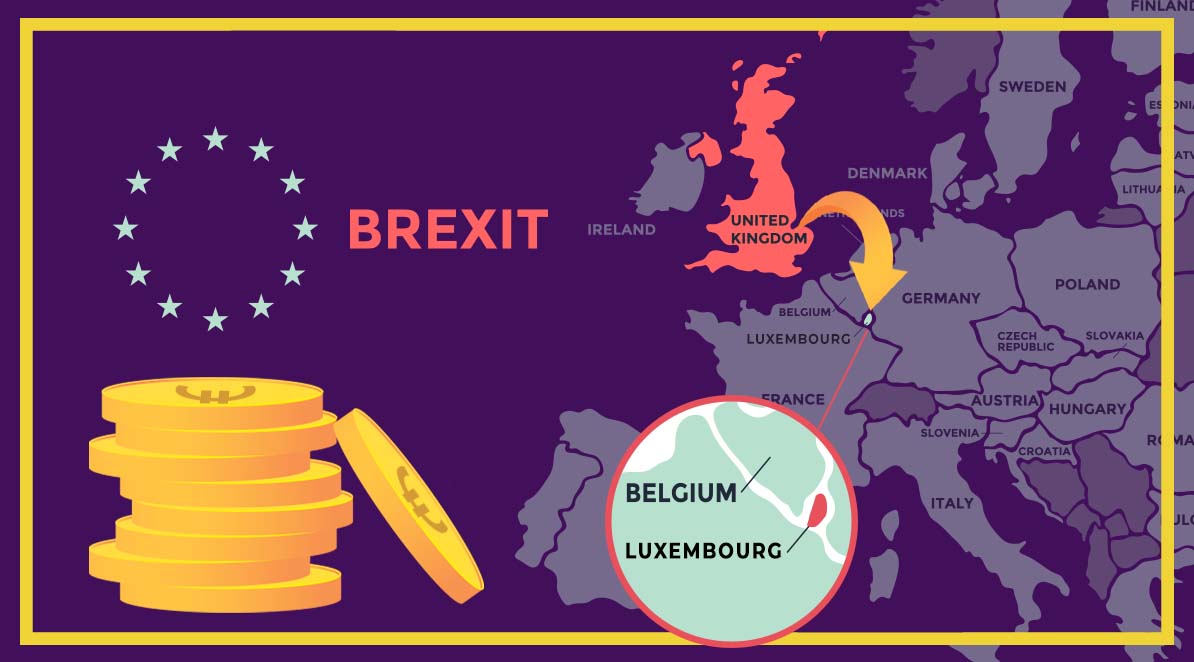There was once a time when Luxembourg was associated in the UK with transmitting popular music across the English Channel via Radio Luxembourg. More than half a century on, the radio station is no more and financial services jobs are leaking back in the other direction because of Brexit.
The tiny native land of former European Commission president Jean-Claude Juncker and (erm) ‘LuxLeaks’ has emerged alongside Dublin, Frankfurt, Paris and Amsterdam as one of the biggest ‘winners’ from Britain’s departure from the European Union (EU), with financial services companies opening there to ensure a continued presence inside the 27-member bloc.
Luxembourg for Finance (LFF), a public-private partnership set up 13 years ago to promote the country’s financial services industry, strives not to be seen as seeking to capitalise on what it sees as a sorry situation.
“We campaigned for the UK to Remain,” says the LFF’s Robert Jarvis, a British-Luxembourgish dual national, in a videocall with #DisruptionBanking. “Luxembourg relies to a large extent on the strength of the EU – anything that makes the EU weaker makes Luxembourg weaker. Despite short-term gains of business and people moving, in the long-term Brexit is definitely a loss for Luxembourg and the EU. London and Luxembourg have seen themselves as spiritual brothers, and losing a big brother hurts.”
LFF is behind a website, MoveToLux.com, through which the Grand Duchy markets itself internationally via videos of ex-pats riding horses and jogging through beautiful, bucolic landscapes. The site pre-dates the UK’s 2016 EU referendum and is globally focused, not an explicit appeal to financial services Br-efugees, Jarvis says.
Why are more and more finance professionals moving to Luxembourg 🇱🇺? Meet Cara, Morten and Vittoria who explain why they decided to move to Luxembourg to achieve a better work-life balance.
— LuxembourgForFinance (@LuxFinance) January 13, 2021
▶️ https://t.co/TlJ7jA2xdf#MoveToLux #QualityOfLife #Expats pic.twitter.com/MRrYDlFK6R
So, how many finance professionals has Brexit – so far – caused to ‘move to Lux’? It’s not a precise science but estimates have put the jobs created in Luxembourg because of Brexit at about 3,000. Longer term, LFF believes the figure could be about 5,000.
“In Luxembourg, the creation or arrival of even a couple of hundred financial services jobs has a relatively large impact,” observes Andy Notter, a British national in Luxembourg who specialises in financial services at recruitment firm Anderson Wise and who is also vice-chair of the British Chamber of Commerce (BCC) for Luxembourg. “I think people always have an initial view of moving for one year, and then seeing how they feel. It’s often said, though, that you end up staying here for 20 years. Luxembourg is not as ‘transactional’ as, say, Singapore or Switzerland are often seen as for non-native workers. People do tend to settle more,” he says.
In terms of the number of financial services companies opening a new Luxembourg presence since the UK’s referendum, 64 have done so far, with almost half in asset management (31), according to a tally being maintained by LFF. The rest are in insurance (13), banking (11), fintech (six) and investment (three). New Financial, which is tallying up financial services firms that have ‘moved something, somewhere’, put Luxembourg’s number at 84 during a recent webinar (the think-tank’s other stats were Dublin at 128, Paris 88, Frankfurt 56, Amsterdam 47 and Brussels 10).
“We have been happy to help businesses find solutions. But we did that in a Luxembourg way: on a small scale, pragmatic, honest and open. But we didn’t roll out the red carpets,” says Jarvis. That said, Luxembourg did flash scarlet-coloured woven nylon at the European Banking Authority, which was obliged to relocate from London because of Brexit, but (like Frankfurt and others) lost out to Paris.
Luxembourg (along with Dublin) has for many years prospered as a hub for administrative services and back office work, outsourced from London, the consultancy Duff & Phelps noted recently. But Brexit is a different kettle of fish.
Among the corporate arrivals checking in at the Grand Duchy’s airport was Citigroup, a relatively early post-Brexit mover that picked Luxembourg as new HQ for its private banking work in 2017.
Citi Private Bank’s Gregor Bollen was among the speakers at a Brexit-focused panel event organised last month by LFF, sharing insight that is likely typical of how such big global banks see Brexit and how they have adjusted their geographic footprint.
“Things have definitely become more complicated for us,” Bollen told the audience. “We can no longer rely on ‘passporting’ – servicing European clients being based in the UK. So, as a practical consequence, we have had to move the team that was proving advice to our private banking clients in the area that I oversee from London to Luxembourg. It is impossible to advise clients in the EU with people that are outside. In the pre-Brexit world, that was a lot easier. London is still our EMEA HQ, we have about 8,000 people Citi-wide working in London. Even though we have moved parts of our business to Frankfurt and the private-banking part of our business to Luxembourg, we rely on product specialists and the like who are still based in London.”
Couldn't make it to our 'FOCUS ON life after #Brexit' livestream?
— LuxembourgForFinance (@LuxFinance) February 25, 2021
Catch the recap and replay available on our website for insights on how financial services are managing in the new cross border regulatory framework and what developments can be expected: https://t.co/MCm6EerGvr pic.twitter.com/1cwBQ8cd8n
Citi’s new structure reflects the more complex, multi-polar world of European banking. “We were lucky enough, or wise enough, to have our EU clients that we were servicing out of London, we [already] had them booked in our Dublin-based bank. And we set Luxembourg up as a branch of the Dublin bank, so it was fairly easy, with not a whole load of administrative burden for our clients, to move them from London to Luxembourg, which we already did ahead of Brexit in January and February 2020,” Bollen explained.
In terms of further US-headquartered banks, Goldman Sachs has registered a new entity in Luxembourg, while JP Morgan’s private bank selected the country as its new EU HQ (both have also expanded in Frankfurt). Canada’s CIBC Capital Markets announced a Luxembourg opening last July.
But as LFF’s tally shows, asset management has proved to be Luxembourg’s richest seam. The country has positioned itself over many years as Europe’s UCITS (Undertaking of Collective Investment in Transferrable Securities) processor-in-chief, as well as more recently for European Long-Term Investment Funds (ELTIFs). ‘Brexit’ movers include M&G and Columbia Threadneedle.
“Most initial Brexit-related jobs in Luxembourg were central controlling functions, which are necessary to get an entity licensed by the regulator,” says Jarvis, describing how Brexit relocation dynamics have shifted, and will continue to shift. “In practice that means that it doesn’t need to be a stereotypical 2,000-person office for a bank, it could be 200 in one head office – with 1,800 other jobs spread elsewhere thanks to the delegation model and the ability to outsource some functions to other entities and locations (such as portfolio managers in London or back-office services in Poland or India, and so on). Now that the industry understands Brexit better and the dust has settled, the shift has gone from recruiting controlling functions to now recruiting for operational jobs.”
The country’s photogenic capital, Luxembourg City, inevitably doesn’t offer the urban vitality of most rival financial centres – as reflected by #MoveToLux’s sylvan scenes – while the ‘tax haven’ accusations that have long sullied local marketers’ mood music continue to bubble along. The country was placed sixth in a ranking published last week by the Tax Justice Network of nations ‘most complicit in helping multinational corporations pay less tax than they are expected to’.
World's top 10 enablers of corporate tax abuse:
— Tax Justice Network (@TaxJusticeNet) March 9, 2021
1 🇻🇬 British Virgin Islands
2 🇰🇾 Cayman
3 🇧🇲 Bermuda
4 🇳🇱 Netherlands
5 🇨🇭 Switzerland
6 🇱🇺 Luxembourg
7 🇭🇰 Hong Kong
8 🇯🇪 Jersey
9 🇸🇬 Singapore
10 🇦🇪 UAE
Our Corporate Tax Haven Index 2021 is now out: https://t.co/sS9xkQGrSk
Luxembourg’s government is fresh from putting out a statement rejecting a comprehensive analysis – dubbed ‘OpenLux’ – that mined a similar furrow to 2014’s LuxLeaks scandal.
“We often get asked by businesses: ‘How can we reduce our tax bill? It’s not competitive’. But we no longer compete in tax,” says Jarvis. “Luxembourg’s corporation tax rate is 25 per cent. We have a bad reputation, but the reality is completely different.”
As one of the three official seats of the European institutions (along with Brussels and Strasbourg), and with the country being one of what is now the EU’s founder members, it would be difficult to conceive a more rock-solid Euro-state. About 50 per cent of Luxembourg’s total population of about 625,000 are from outside the country (the proportion is higher in the capital), and many workers commute daily from neighbouring France, Belgium and Germany.
“Luxembourg has always been open and international. But for some other cities to try and attract ‘Brexit’ jobs required more of a change of mindset,” says Jarvis, adding that Luxembourg “didn’t have to change anything, or have any fast-track procedures for Brexit relocations…. all our regulatory documents, corporate filings, contractual law could already be done in English, since 20-30 years ago.”
So, what’s next? “Our priority is keeping the relationships with London going,” Jarvis says. “We have the largest asset management industry in Europe, second in the world only to the US. But many portfolio managers sit in London, so it’s about ensuring these relationships keep working, so the products are set up in Luxembourg, sold internationally, and managed from London and Tokyo and New York.”
There’s keenness to keep links active in emerging fields such as green finance, too (Luxembourg recent published a sustainable finance strategy).
Meanwhile, negotiations on equivalence will keep the ‘B’ word bubbling, even though the Brexit show has closed in headline terms. Luxembourg-based European Fund Administration (EFA) chief executive Noel Fessey was particularly insightful on this topic during the LFF’s recent webinar, as was a panel session involving Luxembourg’s Commission de Surveillance du Secteur Financier (CSSF):
According to Isabelle Jaspart, @cssflux has set up a clear, accessible and permanent national regime for UK entities willing to provide investment services in #Luxembourg.
— LuxembourgForFinance (@LuxFinance) February 23, 2021
➡️ https://t.co/CmKZ0lFuli pic.twitter.com/E3UzNJUCkd
A glance at the BCC for Luxembourg’s upcoming events is also an indicator of how Brexit’s aftershock rumbles on. On 24 March, for example, a session will include a discussion of ‘Covid-19 in a post-Brexit Luxembourg: what impact on corporate governance, branches, European corporate entities, cross-border mergers, governing law and jurisdiction clauses?’.
“I think a lot of companies were sitting on the fence until the final deal [December 2020] and have now realised they do need to do something,” says Notter. “So, I think there will be a constant drive of further business moving from the UK into Europe, particularly Luxembourg. It’s hard to say in numbers, but I would span out that movement for the next five to ten years.”
By Ian Hall
#Luxembourg #AssetManagement #Banks #LuxembourgForFinance #Brexit #MoveToLux #Citi #equivalence #passporting #London #OpenLux #FutureBankingCareers
‘Brexit fallout: how is “Bankfurt” doing?’: in a previous article for #DisruptionBanking, Ian examined how Germany’s banking hub, Frankfurt, is faring in a Brexit context
















3 Responses